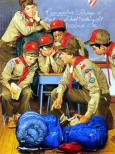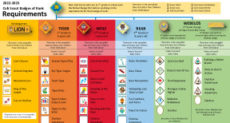 A couple weeks ago, I was at a quarterly Court of Honor for one of the Scouts BSA troops in the area. I had been invited to give a Friends of Scouting presentation to the troop families. As was customary with the troop, the master of ceremonies asked each patrol’s Scouts to introduce themselves by name and rank and to tell their position of responsibility.
A couple weeks ago, I was at a quarterly Court of Honor for one of the Scouts BSA troops in the area. I had been invited to give a Friends of Scouting presentation to the troop families. As was customary with the troop, the master of ceremonies asked each patrol’s Scouts to introduce themselves by name and rank and to tell their position of responsibility.
I noted that most of the Scouts would say “I don’t have a position in the troop” before concluding their introduction by telling their favorite video game. That didn’t seem right to me – there were only four or five out of thirty or so Scouts who said they had a position.
The MC introduced me after dinner and before the senior patrol leader took over for the awarding of rank recognitions. But before I spoke to the families about FOS, I turned to the Scouts.
“Most of you said you have no position of responsibility in the troop, but I’d be willing to bet that you do. You just don’t realize it,” I said. “For every one of you is responsible for something – every one of you is, and can be, a leader.”
Indeed, every Scout can be a leader. Of course, one doesn’t just jump right into leadership at the top – it’s built up in steps over time.
- First, one learns to lead himself – taking responsibility for his things, his achievements and his behavior.
- Then, one learns to work with others cooperatively on common goals, such as setting up camp, cooking meals or guiding one another on a hike.
- Next comes being in charge of one of the functions of a patrol, such as the equipment, the food, or the morale.
- Eventually, one is ready to lead the patrol and be responsible for its functioning and its success. This leadership carries on upward to the troop level as a member of the patrol leaders’ council.
The traits and trends that apply to the workplace can be translated to encourage youth to become leaders as well. Leadership development consultant Marlene Chism writes about five steps employees can take to practice leadership, and the principles apply to Scouting as well.
- Often, young people haven’t learned to communicate effectively or completely, so asking for a clear explanation of the mission or task at hand can help improve patrol functioning.
- The path to First Class requires learning a number of skills that Scouts need to be comfortable in the outdoors. Learning the skills and learning them well can help a Scout become a leader, as can practicing and teaching those skills to other Scouts.
- Some problems Scouts encounter require critical thinking and creative problem-solving. Many teambuilding exercises employ games that sharpen these skills. Learning to be resourceful can help move the needle along and show others the kinds of things that can help them help the patrol.
- When a task is to be done or a position function performed, accepting responsibility for its proper execution is the first step toward successfully completing it. Ownership of a problem or process makes it all the more likely that the Scout will learn how to see it through.
- Just as advancement requirements are tested and reviewed, leadership development should be reviewed as well. A more experienced Scout can be the appropriate person for a new or budding youth leader to ask for advice, and the Scoutmaster should always be available for an impromptu conference on any topic. And Scouts should be given positive feedback when you notice them doing something right.
In much of life there are winners and losers, but when it comes to leadership development, every Scout can be a winner. Encourage them to take responsibility, think creatively, and help others as they go. Give them kudos when they do a good job, and offer encouragement and guidance to keep improving. Title or no title, every Scout has that opportunity.
This post first appeared on Bobwhite Blather.





